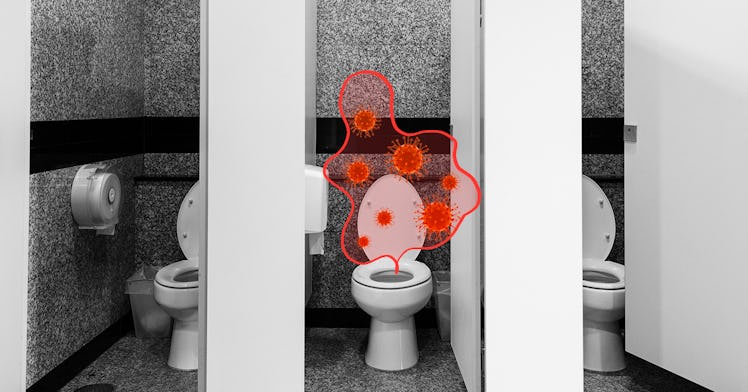Flushing a Public Toilet Can (Probably) Spread Coronavirus
Oh sh*t.

As if things weren’t stressful enough, now you’ve got to avoid public toilets, pretty much at all costs. Apparently, flushing the toilet could spread the novel coronavirus by expelling fecal and virus particles into the air, according to a new computer model study. That’s a scary possibility as the economy and public bathrooms — yes, including those work stalls — begin to reopen. Even if you had fear of public restrooms before, get ready for some cringe-worthy science.
Toilets are “among the daily but dangerous necessities of life,” according to the authors of the study. When you flush, the turbulent motion of the water careening around the bowl forces air up and out by nearly three feet — and poopy particles along with it. Depending on the type of toilet, 40%–60% of the particles are propelled above the seat. This motion can probably suspend the virus particles as aerosols for more than 30 minutes.
Researchers have detected coronavirus in COVID-19 patients’ feces, but they aren’t sure if the virus in poop can spread the disease. “There is not yet clear evidence for fecal-oral transmission,” according to a statement from Bryan Bzdek, an aerosol researcher at the University of Bristol in Britain. However, many experts suspect that poop particles can be infectious. That’s why the New York City health department recommended that people avoid rimming. However, researchers have no clue how many cases of COVID-19 are caused by flushing down the brown. “Even if the virus were contained in the produced aerosols, it is unknown whether the virus would still be infectious,” Bzdek said.
Other viruses in poop can also be blown into the air with a flush. SARS and MERS could both be spread this way, as well as the norovirus and rotavirus, which cause diarrhea. For all these bugs, flushing at home and in public bathrooms is a possible source of spread. But flying feces can be stopped by one simple act: closing the lid. Of course, many public restrooms don’t give you this option.
Aerosolized virus particles can stick around, so keep your mask on in public bathrooms (although that is by no means a guarantee to help keep the feces out of your airways). The particles eventually settle and contaminate surfaces near the toilet, so touch as few as possible and squat above the seat. When you leave, wash your hands. And remember that poop flying through the air isn’t the only risk. “I’m more worried about other people talking in the bathroom,” Linsey Marr, an engineering professor at Virginia Tech who studies the airborne transmission of infectious diseases, posted on Twitter.
So don’t freak out about the flush, but try and hold it when you’re not at home. And when you can, put the damn lid down.
This article was originally published on